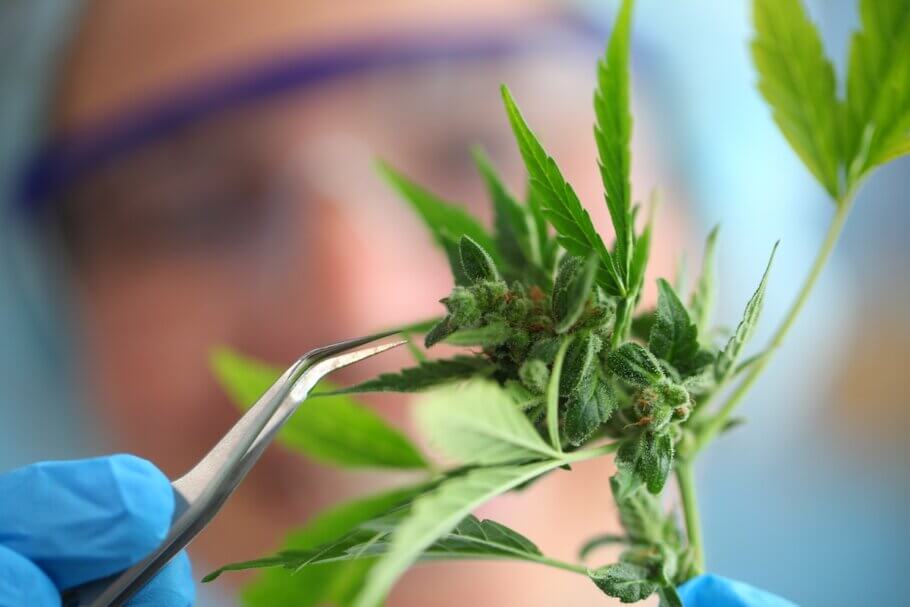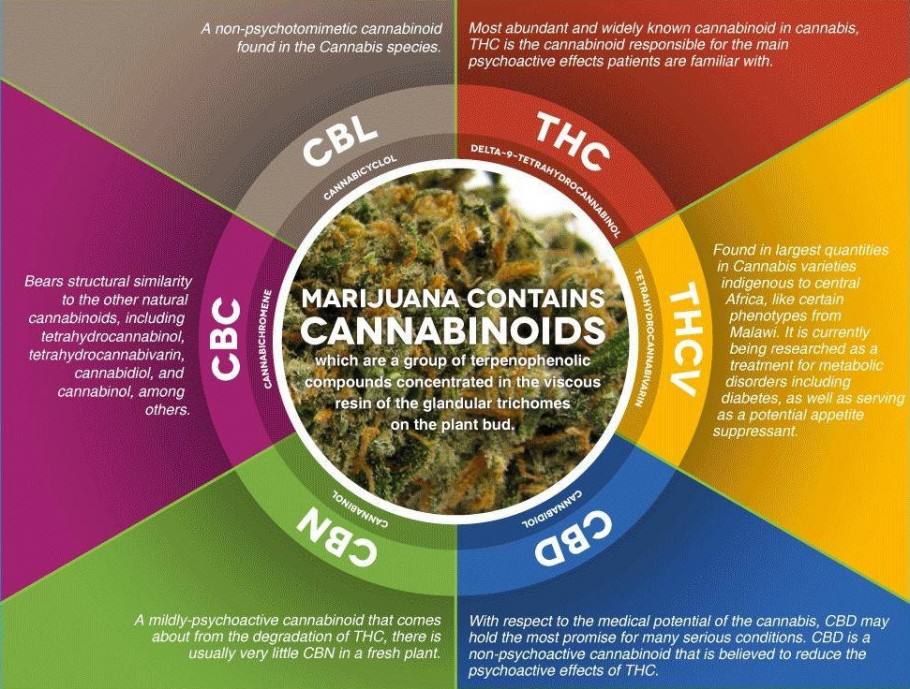The munchies: cannabis and a craving for food
List of contents
Although each marijuana strain delivers different effects depending on its composition, most varieties have one clear factor in common: they leave you feeling incredibly hungry once their effects wear off. One of the cannabinoids responsible for this could be the main star of the plant, i.e. THC. Even though its content is below 1% in some strains (particularly those known as ‘Pure CBD’), this component is still present in most varieties on the market, especially in those aimed at recreational use.
However, there are more factors in this relationship between marijuana and food cravings that have been researched scientifically.
The role of THC in cannabis-induced food cravings
The endocannabinoid system (ECS) is an intercellular communication system formed by endogenous cannabinoid receptors (or endocannabinoids) that interact with marijuana’s natural cannabinoids (or phytocannabinoids). This system regulates many metabolic functions in mammals and plays a key role in the regulation of hunger.
When THC interacts with the ECS via one of its receptors (CB1), this activates and triggers various neurological pathways involved in hunger and the active search for food:
- It improves the sense of smell: it enhances the appreciation of the smell of food, making it more appetising than usual.
- It increases the secretion of the ghrelin hormone: this is one of the hormones responsible for appetite stimulation. It is released in some stomach cells when the stomach is empty, with the secretion decreasing as you start eating. Its release through the activation of the CB1 receptor could explain why cannabis users feel hungry despite having a full stomach.
- It counteracts the action of the leptin hormone in the hypothalamus, the region in the brain responsible for hunger regulation. This hormone is produced by the adipose tissue and acts on the hypothalamus to suppress hunger; but the activation of the CB1 receptor antagonises its action.

The role of cannabis hedonism
Many of the studies that have analysed the effects of THC on the hunger activation systems have been carried out in animals. In order to gain some evidence in humans, researchers at the University of Liverpool decided to distribute a questionnaire among cannabis users to explore the psychological aspect behind the munchies.
First, they distinguished the two main effects of the munchies: the hedonic factor and the appetite factor. The former is responsible for the enjoyment of food and the sensory experience that accompanies the act of eating; the latter is responsible for appetite and the urge to eat.
It seems that the hedonic factor plays a very important role in the munchies produced by cannabis, and is directly affected by the endocannabinoid system.
- Flavour: most participants claimed to have a better eating experience in terms of flavour after cannabis consumption. They stated that food tasted different, i.e. more intense and flavoursome. They also pointed out that they could appreciate a greater range of flavours than usual, and that these were more complex.
- Sensory pleasure: the simple act of chewing and swallowing was more pleasurable. They could also appreciate more textures in the food.
- Temperature: the sensation caused by the temperature of the food also increased the level of pleasure after cannabis consumption.
The part of the brain called the nucleus accumbens shell (or NAcc shell) could be an endocannabinoid hedonic point of access for sensory pleasure.
This occurs because CB1 receptors are widely expressed in the nucleus accumbens. Therefore, THC could activate the reward and pleasure mechanisms that this part of the brain regulates. According to the study, this could be the cause behind the hedonic experience of the munchies.

What type of food is more appealing after consuming marijuana?
Contrary to previous studies, the results of the survey by the University of Liverpool ruled out sweets as the most appetising snacks. Most users that answered the questionnaire stated that any type of food seems appealing. This has opened the door to some interesting medical applications.
Users are aware that cannabis whets the appetite. And not only that: it also makes you enjoy food to an even greater level, as you can find nuances that would go totally unnoticed for someone who wasn’t under the effects of the plant.
Let’s now meet the last protagonist of the fascinating world of the munchies.
The role of sleep
An American study published in 2019 investigated the effect of sleep on the endocannabinoid system. It is well known that sleep deprivation causes an increase in appetite. In addition, our food preferences change when we haven’t had enough hours of sleep or a good quality sleep. In those circumstances, the body craves sweet and calorie-rich foods to provide that additional energy needed to endure the day ahead. But why does this happen?
Looking for an answer to this, the study confirmed that the endocannabinoid system is affected by a lack of sleep, which translates into an increase of one of its components: 2-Oleoylglycerol (aka 2OG). This substance is a monoacylglycerol found in biological tissue that is capable of producing changes in the regions of the brain responsible for the perception of the smell of food, thereby making high-calorie meals more appetising than usual. Does this sound familiar?
The effect of sleep on the endocannabinoid system does in fact bear a certain resemblance to the effect of cannabis in the way that it activates wild hunger. Therefore, a good way of preventing it, or at least keeping it at bay, is not to add a lack of sleep to a cannabis sesh.

Beneficial applications of cannabis-induced hunger
Not all the consequences of getting the munchies are unpleasant. Many research studies support these endocannabinoid system mechanisms as a tool to increase appetite in certain situations.
This is the case of anorexia/cachexia, a syndrome derived from certain chemotherapy and radiotherapy treatments for cancer that produces both appetite and weight loss in patients. THC treatment for this condition has had good results in some experimental studies.
Cannabinoids and their medicinal properties
In this post we show cannabinoids together with their known importance, and explain their main medicinal purposes. There are many strains of marijuana with different compositions of cannabinoids, choosing the most appropriate strain according to medicinal needs will be a lot easier with this guide to cannabinoids in marijuana.
Treating obesity with the munchies
Despite everything that’s been explained so far, cannabis still never ceases to amaze. If you thought that the munchies were something totally unwished for during the ‘battle of the bulge’, a 2013 Canadian study wants to convince us otherwise.
Part of the premise is that the prevalence of obesity is much lower in cannabis users. The study also manages to rule out cigarettes, sex, or age as other possible reasons that could explain this phenomenon.
Hence, this team of researchers established the hypothesis that exposure to marijuana cannabinoids, especially THC and CBD, has a direct correlation with obesity prevention. According to their theory, these compounds would have an antagonistic effect on the CB1 receptor after prolonged administration.
This means that, over time, the CB1 receptor would start to lose sensitivity to its agonistic action (the key that opens the receptor and activates it), so it would stop activating through its union. When this happens, THC and CBD end up acting like antagonists because they bind with the CB1 receptor, thus stopping other endocannabinoids from binding with it that could otherwise activate it.
As a result, the receptor stays dormant and inaccessible, like a locked door. This way, the pathways of hunger and search for food that the receptor could initiate also remain closed.

How to prevent excessive hunger when using cannabis
If the hypothesis above doesn’t convince you and you still want to avoid getting the munchies at any cost, you’ll be pleased to hear that there is a solution that doesn’t involve giving up cannabis.
It seems that all you need to do is choose THCV-rich strains. THCV is a cannabinoid that usually appears in lower counts than THC or CBD, but that has been discovered to hold very interesting properties; among them its satiating effect.
According to a study published in January 2020, the main advantage of THCV over THC for the treatment of certain diseases is its lack of psychoactive effects. However, this is a controversial topic. Some studies, like the one just mentioned, claim that this cannabinoid doesn’t cause THC’s intoxicating effect. At the same time, other sources maintain that it actually does produce psychoactivity, but that it doesn’t last as long and is characterised by a more lucid and energetic effect. Therefore, more research is needed to shed further light on this issue.
What has been proven is that this cannabinoid can inhibit appetite, accelerate metabolism, and benefit glycaemic control. This means that it could be used in the treatment of disorders like diabetes and obesity in the future.
This is why so many companies in the industry are now focusing their efforts on obtaining THCV-rich strains, so that maybe the munchies will soon become a users’ choice rather than an automatic secondary effect of cannabis consumption.
—--
References:
- Cannabinoids enhance gastric X/A-like cells activity. Robert Lukasz Zbucki, Bogusław Sawicki, Anna Hryniewicz, Maria Małgorzata Winnicka
- Negative Regulation of Leptin-induced Reactive Oxygen Species (ROS) Formation by Cannabinoid CB1 Receptor Activation in Hypothalamic Neurons. Letizia Palomba, Cristoforo Silvestri, Roberta Imperatore, Giovanna Morello
- Exploring the munchies: An online survey of users' experiences of cannabis effects on appetite and the development of a Cannabinoid Eating Experience Questionnaire. Carl A Roberts, Gerry Jager, Paul Christiansen, Tim C Kirkham.
- Olfactory connectivity mediates sleep-dependent food choices in humans. Surabhi Bhutani, James D Howard, Rachel Reynolds, Phyllis C Zee, Jay Gottfried
- Cannabis and Δ9-tetrahydrocannabinol (THC) for weight loss? Bernard Le Foll, Jose M.Trigo, Keith A.Sharkey, Yann LeStrata
- Δ9-Tetrahydrocannabivarin (THCV): a commentary on potential therapeutic benefit for the management of obesity and diabetes. Amos Abioye, Oladapo Ayodele, Aleksandra Marinkovic, Risha Patidar.


































































